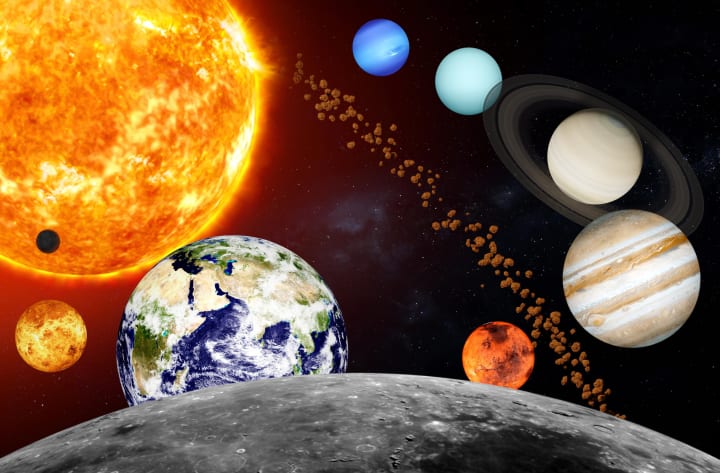What Happens if we stay on Mercury for just few minutes
Interesting facts about the smallest planet in our Solar System

Mercury is the smallest planet in the solar system, crucial for research.
1. Physical Characteristics:--
Mercury, the closest planet to the Sun, experiences extreme temperature shifts due to its lack of atmosphere for regulation.
2. Surface Features:----
The surface of Mercury is similar to the Moon with craters, plains, mountains, valleys, and scarps. Mariner 10 and MESSENGER missions have revealed past geological and volcanic activity.
3. Uniqueness: ----
Mercury has a slow rotation, spinning on its axis only three times for every two orbits around the Sun. This creates a unique day-night cycle due to gravitational interactions with the Sun.
Summary :-
Mercury is the smallest planet in our solar system, known for its proximity to the Sun and extreme temperature changes. It orbits the Sun at a distance of 36 million miles, completing an orbit every 88 days. Its surface is heavily cratered and shows evidence of past geological activity, with plains, mountains, valleys, and scars. Despite its thin atmosphere, Mercury lacks significant weather. Exploration by spacecraft has revealed valuable information about its surface, composition, and magnetic field, making it an intriguing subject for astronomers and planetary scientists.

Bharat’s mission towards Mercury:-
As of January 2022, India has not initiated specific research projects solely dedicated to Mercury. The Indian Space Research Organization (ISRO) has been actively engaged in planetary exploration, particularly focusing on the Moon and Mars through missions like Chandrayaan and Mangalyaan. There is a possibility that India may explore Mercury in the future or collaborate internationally on Mercury research. However, detailed information on Indian projects related to Mercury exploration is currently unavailable.

What happens if someone spends few times on Mercury:-
Spending time on Mercury would be an extreme and potentially fatal experience due to several factors. The planet has extreme temperature swings, ranging from -290°F at night to around 800°F during the day, mainly due to its proximity to the Sun and lack of a significant atmosphere. The thin atmosphere of Mercury offers almost no protection against the Sun's radiation or the vacuum of space. The harsh surface conditions, heavily cratered terrain, rugged terrain, and frequent meteor collisions pose dangers to anyone on the surface. Additionally, limited resources such as no breathable air, very little water, and difficulty in building infrastructure make survival on Mercury nearly impossible without advanced technology and protective equipment. Overall, spending time on Mercury would be extremely difficult and dangerous for humans.
Mercury presents several challenges for humans due to its extreme environment. Temperatures can reach 430 °C during the day and drop to -180 °C at night, requiring advanced thermal insulation systems. The planet's thin atmosphere offers minimal protection from solar radiation and meteorite impacts, necessitating advanced life support systems. Solar radiation on Mercury is intense and can cause radiation sickness and DNA damage, requiring radiation-resistant materials and protective technologies. The rough, cratered surface lacks vegetation and water sources, requiring innovative construction techniques for human habitats. Resource scarcity, including water and atmospheric gases, requires closed-loop resource management systems and advanced mining techniques. Communication delays due to Mercury's proximity to the Sun can interfere with signals, necessitating robust communications infrastructure.
Meeting the challenges of establishing a human presence on Mercury will require high-tech development, careful planning, and cooperation between space agencies and scientific institutions. Despite the obstacles, the opportunity to explore and discover on the closest planet to the Sun presents exciting possibilities for scientific advancement beyond Earth's borders.





Comments
There are no comments for this story
Be the first to respond and start the conversation.